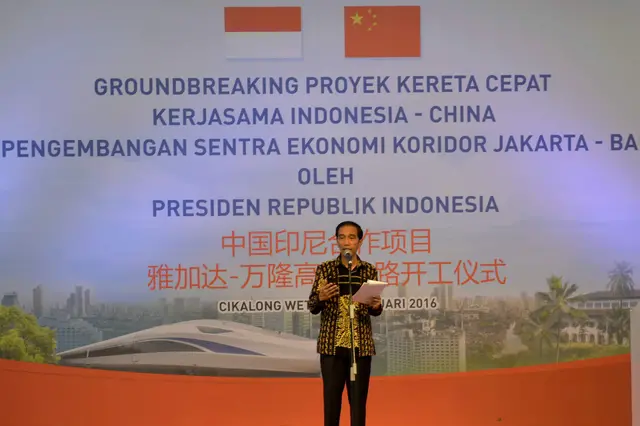Indonesia has officially started its high-speed railway project (HRP) to link the nation's capital city of Jakarta with the West Java provincial capital of Bandung.
The project coming to fruition was the result of extensive cooperation with China, the largest economy in Asia, with the collaboration to boost connectivity also uniting both nation's economies and enhancing bilateral ties, as well as adding to the further future prosperity of both countries.
The project commencement was inaugurated on Thursday by Indonesian President Joko Widodo in Walini, a Western Bandung area that will benefit greatly from the HSR train transport system, both in terms of increased connectivity, and new economic opportunities in the region.
"This is a great cooperation between the Indonesian and Chinese governments, with talks on the project beginning in 2014. Finally, thank God, today we can make begin construction of the high-speed train connecting Jakarta to Bandung," President Joko Widodo said in his remarks at the groundbreaking ceremony.
The groundbreaking ceremony marked the commencement of the first HSR railway project in Indonesia and in the wider Southeast Asia region as well.
The HSR project which will see tracks laid covering 150 kilometers, will be jointly carried out by a consortium of both Indonesian and Chinese firms, namely Pilar Sinergi BUMN. The new high speed service, slated to be operational in 2019, will be jointly administered by Indonesia and China through a firm called Kereta Cepat Indonesia-China (KCIC), in which Indonesia controls 60 percent and China 40 percent.
The HSR project is designated to boost the economy of cities along the line, as Indonesia plans to develop urban area around Walini. The train itself will be able to connect Jakarta to Bandung in just 40 minutes, with the service uniting the two cities and brining myriad economic benefits along the new corridor.
Welcoming the commencement of the project, Chinese President Xi Jinping sent a letter to President Joko Widodo, saying that the HSR project is an important consensus between the two countries and also a great early achievement after the conjoining of Chinese and Indonesian strategies.
He added that the project will serve as a fresh model for cooperation in other fields, especially in infrastructure and production capacity.
Indonesia and China have a number of common economic initiatives comprising the 21st Century Maritime Silk Road and Indonesia's Global Maritime Axis vision. Aligning the two initiatives would offer important opportunities for the two nations in seeking common development and prosperity, the Chinese president said.
China's initiative was first introduced by Xi during his visit to Indonesia in October 2013, when the two nations set up a Comprehensive Strategic Partnership in various fields.
President Xi hopes that the two sides will make persistent efforts and cooperate closely to ensure the smooth implementation and timely completion of the project, making it a successful example of China-Indonesia mutually beneficial cooperation.
"A good beginning is half done. In the future construction process, I believe the two teams will closely cooperate and work together to implement the important consensus reached by two leaders in time, with the highest standard and best technologies," Chinese State Councilor Wang Yong said at the project commencement ceremony.
"The landmark project will become a symbol of mutual benefits, promoting economic development along the route and enhancing the lives of local people," he added.
The HSR project, the deal of which was officially inked in October last year, was praised by leaders of the regions that stand to benefit. They said that it would cultivate new economic centers, coupled with offering an advanced train transportation service.
"The operation of the HSR will generate positive knock-on effects along the corridor of Karawang, Walini and Tegal Luar. In general, it will spur investment and tourism in West Java, not to mention the huge job opportunities connected to the HSR operation," West Java Governor Ahmad Heryawan said in his remarks at the ceremony.
He added that administrations of areas connected by the railway were enthusiastic about the project and they have issued official permission letters to facilitate the project's development swiftly.
"I thank to leaders of five regions and three municipalities whose jurisdictions will be passed along the HSR corridor, for their swift permission issuance process. Some permission processes were settled within three days, perhaps the fastest since the independence of the country," Ahmad added.
Bandung Mayor Ridwan Kamil said that the operation of the HSR service is not merely about transporting people between Jakarta and Bandung. "The operation of the HSR train would serve as a new economic corridor, producing a huge influx of investment," Kamil told Xinhua on the sidelines of the commencement ceremony.
He expected that the successful operated HSR trains would serve as an example for more such projects serving other routes possibly in Indonesia.
Meanwhile, President Director of KCIC Hanggoro, Budi Wiryawan, said that the HSR project would source 63 percent of necessary materials locally, employ 39,000 workers during the construction period, and put a priority on employing domestic workers.
He added that completion of the HSR train project would require 70 trillion rupiah (about 5.5 billion U.S. dollars) in financing, the bulk of which will be provided by the China Development Bank.
 简体中文
简体中文

